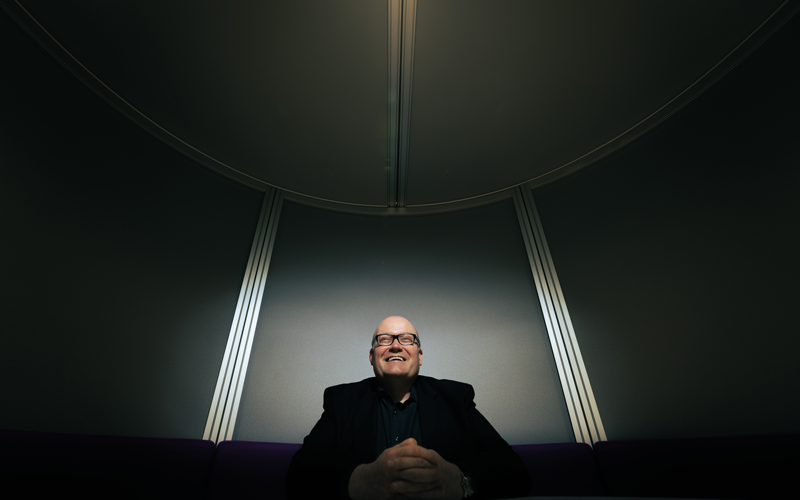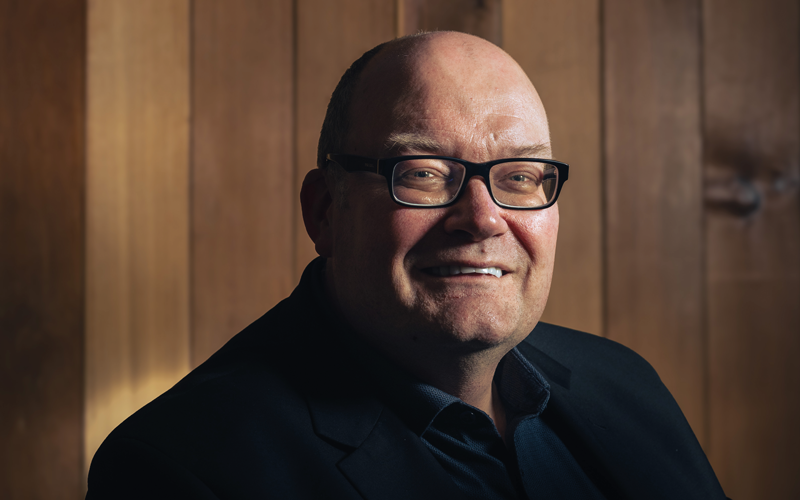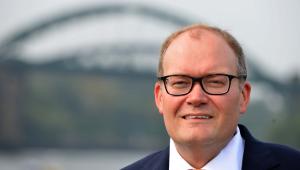
One would expect the chief executive of Arts Council England to be more familiar with film premières than Premier Inns, but, given his cross-country travelling, Darren Henley claims he can date one of the familiar hotels just from the style of its bathroom decor.
“It’s an area of expertise I didn’t expect to gain when joining the Arts Council but I can tell you I can age a Premier Inn by its bathroom floor,” he jokes, before reeling off a list of various colour schemes and flooring materials.
“I could do a whole PhD thesis on this, if I needed to.”
Extensive travel may have equipped Henley with an unexpected party trick, but there is a serious intent underpinning it. Arts Council England, the organisation he has led for the past 10 years, is a body that exists to invest in arts and culture for the entire country, not just the famous attractions of the capital.
Speaking to PF from Liverpool (in, yes, a hotel room), Henley acknowledges that, while London may host some of the country’s most celebrated and prestigious arts venues, from the Royal Ballet & Opera to the National Theatre, that is “not the only story in town”.
It’s vitally important, says Henley, that the Arts Council’s work is felt nationwide. “I believe really strongly that we should have really high-quality, excellent work in villages, towns, cities across the country,” he says.
[London is] not the only story in town. I believe really strongly that we should have really high-quality, excellent work in villages, towns, cities across the country”
Northern soul
In particular, Henley has developed an interest in the post-industrial towns found across much of the North of England and the Midlands.
“They’re places that were very well known for their creativity. They made things.”
While that creativity may not have continued in terms of industrial output, there is value in making new kinds of work and telling stories that are shared across the country.
“A lot of what we do is invest to enable people to tell stories,” he explains. “As a country, we unify ourselves better by having lots of stories and by hearing lots of different points of view and lots of different voices. If you only hear from one place, then that’s not true.”
A key vehicle for celebrating art in the regions is the UK City of Culture initiative, and Henley has recently been in Bradford, which has been named the UK City of Culture 2025. It’s a worthwhile initiative, in Henley’s view, and he reflects on Hull’s experience as City of Culture 2017.
“It changed people’s expectations and the stories people tell about the place. And the stories other people told about Hull,” he tells PF. “So many people went to Hull, probably for the first time, and they saw great things. They realised what a brilliant city it is.”
There are similarly high hopes for Bradford – an example of the kind of post-industrial place that intrigues Henley. Its great heritage is reflected in magnificent architecture, but the city is now struggling and showing some signs of decline.
It is hoped that City of Culture status will help the West Yorkshire city showcase its diversity, heritage and energy. Planned events for the year ahead in Bradford include a production of The Railway Children at the Keighley & Worth Valley Railway; a major new public artwork – Tower of Now – which celebrates the rich mix of cultures present in the city; and an exhibition exploring connections between boxing and calligraphy as seen through the eyes of South Asian Muslim men living in Bradford, and featuring some rare items from the British Library alongside the personal stories of the men themselves.
Henley is excited. “Looking at the programme [Bradford has] got through the year, you’ve got a really interesting mix of things that will be resonant with different communities across the district. At the same time, there are things that, nationally, will significantly attract incoming audiences,” he says.
“Having that focus, knowing that Bradford has a time to shine, that moment in the spotlight is a very powerful thing. So I’m a big fan of the City of Culture.”
Arts Council England is the key national development agency for arts and culture across England, investing both government money – known as grant-in-aid – and National Lottery funds to support everything from libraries, museums and galleries to dance, the visual arts, theatre, festivals and poetry workshops.
Almost 3,000 organisations receive Arts Council funding, including 985 national portfolio organisations, which are funded over a four-year period. NPOs are viewed as sector leaders and range from big household names, such as the Royal Shakespeare Company and the London Symphony Orchestra, to smaller and more niche organisations, such as Brass Bands England and the English Folk Dance and Song Society.

Job creation
The national portfolio was refreshed in 2023, in part with a view to helping arts and culture organisations recover from the pandemic. This saw 275 new organisations join the list, resulting in them receiving more stable funding. That’s something that is bringing its own growth dividend in terms of job creation.
“There are real jobs in this sector,” he says. “We estimated that a couple of thousand jobs were created in just those 275 [new NPO] organisations.”
The Arts Council, says Henley, is not an “either-or” organisation. It’s an “and-and” organisation. “We’re an organisation that can invest at pretty large scale in the Royal Ballet & Opera. The Royal Opera House in the centre of London should be a beacon of international excellence, and we do everything we can to support that. At the same time, we’ll invest in a network of grassroots live music venues in towns across the country.
“They’re equally as important as each other, and it’s really important that we have that real sense of an ecology – a tapestry – across the piece.”
Henley is relentlessly upbeat and conveys an infectious enthusiasm and energy, but he acknowledges challenges. The 10 years he has spent in the CEO’s chair have been characterised by economic turbulence, acute fiscal pressures, political instability and a global pandemic. Reflecting on his decade in charge, his first response is to pay tribute to the innovation and imagination displayed by people working in the arts across the country, but he admits that the context has been very tough.
“The pandemic was obviously an absolute focal point of how tough it was, and how tough it has been economically since then, in terms of cost of living. People working in [the arts] sector achieve enormous amounts in the context of all of that.”
The strain on local government in particular is also acknowledged. When arts funding is considered in aggregate, the biggest funder is local government. According to figures from Newcastle University’s Creative Industries Policy and Evidence Centre, overall public spending on the arts shrunk by around £1bn between 2009-10 and 2019-20, with the majority of this loss coming from cuts to local government revenue spending.
Despite the tough financial climate and the rise in demand pressures facing local authorities, Henley speaks warmly of the Arts Council’s relationship with the sector – several English local authorities are on the NPO list, receiving Arts Council grants for museums, galleries or other cultural activities.
“We can invest at pretty large scale in the Royal Ballet & Opera…. At the same time, we’ll invest in a network of grassroots live music venues in towns across the country. They’re equally as important”
Champions for the arts
Local authorities are important partners for the Arts Council, and understand the power of cultural investment to not only improve local amenities and wellbeing but also attract inward investment, making places more attractive destinations, both economically and in terms of quality of life. Relations with the newer mayoral combined authorities are also healthy, and Henley names several combined authority mayors, including Andy Burnham in Greater Manchester and Steve Rotheram in Merseyside, as big champions for the arts in their area.
The Arts Council has had to grapple with funding reductions of its own. Its grant-in-aid income has more than halved from almost £1.3bn in 2020-21 to £549m in 2023‑24. Despite this, Henley strikes a positive note. “We’ve got less money now than we had back in 2010, [but] we are still investing that money as wisely as we can to make the most positive difference and to be as supportive as we can.”
Henley joined the Arts Council from Classic FM, where he had worked for 23 years, rising from weekend newsreader – a student job he took on while still in his teens – then joining the station full-time after graduating, moving into production and editorial roles. He rose to managing editor, and then managing director.
“We were very much a multimedia brand, so we had a record label and a magazine, and we did book publishing, and we even had a dating agency. So I was able to learn lots and lots about other businesses while never actually leaving Classic FM.”
In that time, he also led a couple of reviews for government – one on music education, and another on cultural education – which set him up well for his current role.

BIOGRAPHY
Music maestro
A graduate of the University of Hull, Darren Henley CBE has several postgraduate degrees to his name, as well as a doctorate in exploring the role of the outside as an agent of change.
He got his professional start in radio journalism, reading the news on Classic FM, which led to a 23-year career with the station.
In 2011, while still with Classic FM, he led an independent review into the funding and delivery of music education on behalf of the Department for Education and the Department for Culture, Media & Sport. This was followed by a review on cultural education. He has also advised the Scottish Government on instrumental music tuition as a member of the Instrumental Music Group.
While classical music is a passion, he says his music tastes are eclectic and wide-ranging. “My Spotify account is very broad!”
Henley’s time at Classic FM led to a productive sideline as an author. “We had an audience who wanted to learn [about classical music] with us, and they were very keen to find out more.” Finding written content that was a good fit for Classic FM’s tone and style was difficult, he says, “so, in the end, it was easier to write the books myself”.
He is the author of many titles, including the bestselling Everything You Ever Wanted to Know About Classical Music But Were Too Afraid to Ask, and has recently revised his 2016 book The Arts Dividend. This makes the case that investment in arts and culture leads to happier, healthier and more fulfilling lives.
“When we talk about dividends, people think about economic dividends. But there’s a dividend to having creativity in our lives. There’s a dividend around creative education and skills for young people. There are dividends around place-making and shaping. There’s a very big dividend around people’s wellbeing and what I would say is their happiness, and there is a dividend also around reputation and storytelling.”
New audiences
Henley took some lessons from Classic FM’s success with him to Arts Council England. The commercial radio station “broke the mould” when it came to classical music broadcasting, with a mission to present music often viewed as high-brow and elitist in a new way, opening it up to new audiences.
At the Arts Council, putting audiences first also sits right at the heart of its strategy. That shift to prioritising audiences was a “big thing”, Henley says. “We start with the audience and work back. Everything about [our 2020-2030 strategy] ‘Let’s Create’ is about understanding the audience and making sure they’re getting the best-quality work close to where they live, but also that they can enjoy their own creative lives as well.”
Creativity, Henley stresses, is not limited to the arts. All professions – from law to engineering – need creativity. While numeracy and literacy are vital, creativity is an incredibly important third pillar of education. “It’s the creativity, it’s the imagination, it’s the sense of possibility, it’s the being able to see the new” that will help drive growth, he argues.
Henley laughingly agrees with the suggestion that we hardly need more creative accountants, but stresses that the arts do absolutely need people with strong financial management skills, and he is full of praise for the resourcefulness and resilience of the executives he has encountered.
“When you meet a finance professional who chooses to make their career in our world, often they are the most purpose-driven people. They’ve got all the skills of someone who might take an accountancy route in a different sort of organisation, but they also have this sense of purpose.
“I think they recognise that the organisation they work for is delivering something that improves people’s lives, and that seems to be a very powerful thing.”
Image credit | Richard Lea Hair


















